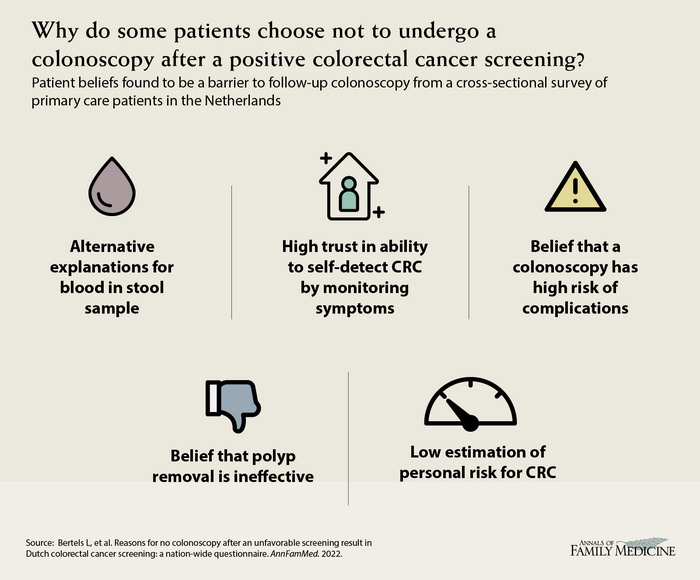While screening by Fecal Immunochemical Test (FIT) can detect colorectal cancers early, successful treatment depends on the patient undergoing follow-up colonoscopy after an unfavorable test result. A paper published by Dutch researchers examines the reasons why some people do not follow up after a positive at-home test. The researchers argue that understanding the reasons people do not follow up with their doctors has global implications for all people at risk of the cancer as it is best treated early.

Credit: The Annals of Family Medicine
While screening by Fecal Immunochemical Test (FIT) can detect colorectal cancers early, successful treatment depends on the patient undergoing follow-up colonoscopy after an unfavorable test result. A paper published by Dutch researchers examines the reasons why some people do not follow up after a positive at-home test. The researchers argue that understanding the reasons people do not follow up with their doctors has global implications for all people at risk of the cancer as it is best treated early.
Reasons for lack of follow-up include concerns about having a colonoscopy; lack of opportunity to discuss next steps with a medical provider; assumptions and perceptions about their personal risk; a belief that the test result is not indicative of cancer; and questioned effectiveness of polyp removal, as well as poor overall health behaviors. The strongest positive association with follow-up was the patient’s belief that their family physician would support colonoscopy, as well as fear of cancer. Researchers suggest that personalized screening counseling may help, as well as the involvement of family practitioners.
Reasons For no Colonoscopy After an Unfavorable Screening Result in Dutch Colorectal Cancer
Screening: a Nation‐wide Questionnaire
Lucinda S. Bertels, PhD, et al
Amsterdam UMC, University of Amsterdam, Department of General Practice, Cancer Center
Amsterdam and Amsterdam Public Health research institute, Amsterdam, and Erasmus
School of Health Policy and Management, Socio‐Medical Sciences, Rotterdam, The Netherlands.
Pre-embargo article link
Permanent link
Journal
The Annals of Family Medicine
DOI
10.1370/afm.2871
Article Title
Reasons for no colonoscopy after an unfavorable screening result in Dutch colorectal cancer screening: A nationwide questionnaire




